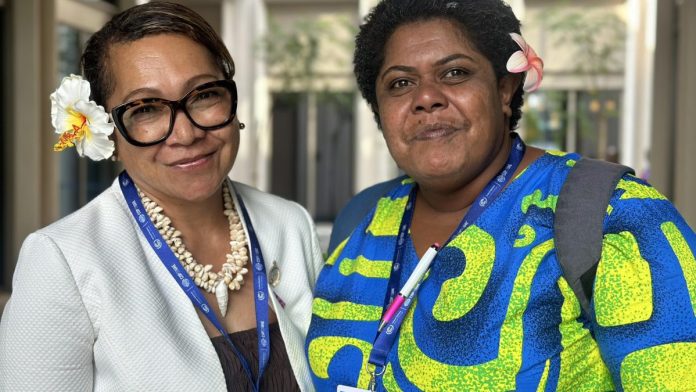She has created history for her nation as the first and only woman of 195 district representatives across the Fiji Islands – now Lavenia Naivalu is making waves across the spaces she is in at her first global climate meeting.
Naivalu is Fiji’s first female mata-ni-tikina of Nacula district in the Yasawa Island group. She is part of a traditional governance system covering 1,193 villages across the 15 provinces of Fiji. At the local government level, those like Naivalu play a connected and crucial role when it comes to informing and hearing from rural communities across Fiji on everything from water to education, health, and access to state services. Then there are the inevitable early warning systems, policy impacts, and feedback on climate and disaster resilience.
The seven districts and two informal settlements of her home district of Nacula in the Yasawa group are directly in the cyclone path for Fiji. Seeing the devastation and impacts of intensifying weather over the years made her decide on the pathway to local government, she says.
“Being the first and only woman district representative in Fiji was not an easy thing to absorb. It is not a norm in our traditional structures, but being able to speak to present clear evidence of success stories on the ground has helped me advocate what women can achieve when they lead. We are natural organisers. We make moves to ensure a future for our families and communities. These are aspects of our home and village roles which help us to act and get things done at district level,” she said.
Now into her third year since taking up the role, she has helped Nacula generate a 20-year Integrated Sustainable Development Plan to grow resilience for families and communities of the more remote parts of Fiji.
In walking the talk for sustainable development, she has supported action for areas such as mangrove management, banana, and yam seedbanks for reducing disaster risk, marine protected areas and coral banks and stronger fisheries management, and water committees to help with management of water in the district.
The achievements of the people of Nacula have brought them attention and praise in the global climate space and has seen Naivalu speak at a range of gatherings and side events across the COP28 venue with its more than 65,000 delegates.
Her message to fellow indigenous leaders, to world leaders and negotiators at COP 28 is very direct: “I am here as a mother, as a fisherwoman and as a representative of a District, and the communities of Fiji and the Pacific,” she told a session with the COP28 Presidency.
“As Leaders, we understand that our role is to be custodians of the truth, and springboards for action. We look up to you to be truth tellers and action takers. We have come together to talk from our hearts and from our experiences about matters of the utmost importance- What would be more important than securing our sources of fresh water, food, our gardens, houses, forests, rivers, and fishing grounds for now, for our children and for future generations.”
Her direct delivery and sharing of the stories confronting those who are often the first to be cut off from the world during cyclones has resonated with audiences at COP28, triggering tears from those listening to the struggles and sacrifices those away from the news headlines, with livelihoods on the growing frontline of climate change.
“It is a norm for families in my community to relocate when a cyclone warning is received. My communities do not invest in or even think of rebuilding their current village site because they know their homes will no longer be there in two or three years. The burial of loved ones on their lands becomes a reburial of human remains because of the seas reaching and washing over our burial grounds,” she shares.
“For me, attending COP28 is a blessing allowing me to share the voices of my community to the world. To help the world know the struggles other families face every day, because of this climate crisis.”
But without action, she warns, it is exhausting work.
“Climate Change is threatening our lives. Our culture. Our heritage. We need the governments who have created this situation to take a new course of action. To see an end to the use of fossil fuels that are causing these threats. To repair the damage that has been caused. We also need to adapt and change to meet the challenges before us.”
In her call as an Indigenous representative speaking to in a closed session with the COP28 Presidency, Naivalu knows the power of stories to connect the most powerful to the least empowered.
“These are our stories. These stories are our children. Our hearts beat through these stories and our ancestral spirits live within these stories,” she says.
Her respect, care and heart for culture, homeland, and legacy is setting some new stories of hope, restoration, and resilience for the COP28 agenda, before she returns home to Nacula.
SOURCE: PIFS/PACNEWS














